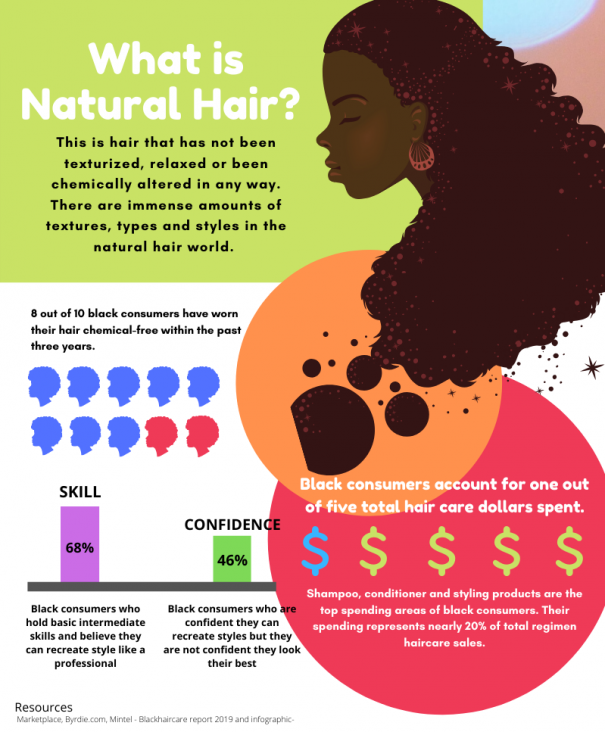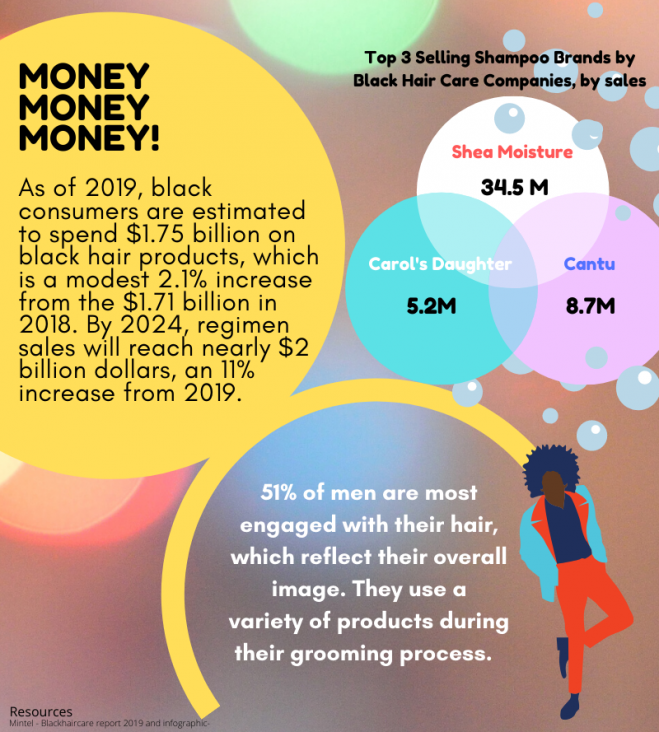Changing stigma around coils, kinks, curls of natural hair
Changing stigma around coils, kinks, curls of natural hair
The strands and tresses from a person’s head can define who they are. But the way they style their hair can cause them to be perceived negatively, which can affect their relationships, work and lifestyle.
Black hair is sometimes shamed, seen as unprofessional or portrayed as untidy. Despite the efforts pushed by mainstream media and the increased exposure of Black hair education, Black people can’t always wear their hair proudly because of social prejudice, but they are trying to show they are more than their hair.
In recent years, there have been several incidents concerning violence and the targeting of Black individuals for wearing their hair, which has increased attention, awareness and incited a call to action towards their mistreatment.
For instance, In September 2019, Promise Sawyers, a 10-year-old girl from Nashville, went viral when she posted a video stating she was proud of her hair after she was bullied for wearing an afro. With millions of views, she told the world she would not let anyone steal her joy or give them power over her.
In the same month, 12-year-old Amari Allen, a student at Christian school in Virginia was playing at recess when three white boys grabbed her, covered her mouth and cut her hair because she had dreadlocks.
Gabrielle Union, a famous actress and activist, was fired last year from America’s Got Talent for her physical appearance because she was considered “too black” for the show.
More recently, DeAndre Arnold had grown his dreadlocks since he was in seventh grade. The 18-year-old high schooler’s hair grew too long for school standards, so he and his parents were given an ultimatum to either cut his dreadlocks or receive in-school suspension. He chose suspension. As a result of the viral story, Ellen DeGeneres featured him on her show, giving him $20,000 to put towards college.
Now, students in the Syracuse community are speaking out about wearing their hair naturally.

Perceptions of Black hair
The negative stigmas surrounding black hair are beginning to disappear as the standards of “acceptable” hair shifts. But this seems to be a trend rather than actual change. The versatile styles of afros, cornrows, braids, weaves, wigs, dreadlocks, waves and shaved designs are ostracized for being “too black” because they do not fit into the mainstream standards.
Chelsea Simpson, a second-year law student studying public relations and international relations at Syracuse University, expressed her awakening when wearing her hair naturally.
“There’s a lack of diversity. I feel as though sometimes you have to tread lightly with the hairstyles, you know, and you can’t be too crazy in their terms,” she said. “Because there is discrimination whether you want to accept it or not.”
Users and content on platforms such as YouTube, Instagram, Twitter, Essence, Vogue and Allure are attempting to educate about Black hair. They also invite discussion of the mental and physical impacts of societal standards, which could include extreme outcomes such as being murdered, imprisoned, fired from work, kicked out of school, bullied, abused, beaten and profiled.
For example, dreadlocks on a Black man carry the stereotype of “criminal” or “unclean.” It is defined as hair that has not been combed, brushed or handled. Over time, it becomes matted and knotted into itself. Black men have also been profiled based on their appearance in the past, specifically because of their dreadlocks.
In Kansas City, Tyree Bell was wrongfully accused and arrested for brandishing a firearm. According to Kansas City star, a message he has to young Black men is: “Don’t sport dreadlocks and a white T-shirt, or you could be arrested for a crime you didn’t commit.”
The power of hair and how it is perceived continues to affect the students in the spaces they enter. For some students, they were introduced at a young age to look presentable according to societal standards because certain hairstyles could bring them trouble in the social and professional world, according to Halston Canty, a social work graduate student at SU, who also has dreads.
“We are continuously not accepting what society places on us as normal. We just say hey, this is who I am,” he said. “And then we get in there and we doin’ the work. We’re creating our own niches, our own avenues. So, I’m still constantly trying to find my identity.”

Finding freedom in hair
The natural hair movement can promote the coming of one’s roots. As men and women begin to embrace their natural hair, the standard no longer conforms to society’s Western ideal beauty. As people begin to get rid of styles that conform to the norm, people begin to embrace their beauty – a beauty under appreciated and hindered, according to Cynthia Robinson in “Hair as Race: Why “Good Hair” May Be Bad for Black Females.”
When people receive negative feedback from their workplace, the public, family and friends, they lack confidence in themselves, said Femi Olu-Talabi, a second-year medical student at SUNY Upstate. Hair, he said, is part of what defines him, and that it should not determine how successful he will be as a doctor.
“I go by this one principle. You know, not everyone deserves to know who you are and not everyone deserves to be a part of your success,” he said. “So, if they choose not to be a part of this success, they good. That’s not my business.”
According to Afiya Mbilishaka’s 2018 academic article, “PsychoHairapy: Using Hair as an Entry Point into Black Women’s Spiritual and Mental Health,” Black women spend a disproportionate amount of time thinking about styling and caring for their hair in comparison to other ethnic groups. The constant manipulation and alterations of their hair can lead to increased emotional distress. As result, a decrease in self-worth and confidence.
These students with natural hair claimed the media helps change the narrative, but there is still work to do. The negative stigmas surrounding natural hair are slowly disappearing as the standards of acceptable hair is beginning to change. The knowledge of Black hair is continuously growing as YouTubers, celebrities, Instagram influencers and even everyday people share and sport their styles with no shame.
For example, Yara Shahidi, Lupita Nyong’o, Issa Rae, Kerry Washington, Taraji P. Henson and Janelle Monae catch the public eye when they dress in designer gowns on the red carpet with a touch of kink or coil. There are vast amounts of natural hair maintenance and style videos, posts and tweets to teach viewers how to keep their Black hair healthy and beautiful. These motivations and images invite Black, and non-Black, to acknowledge Black hair in the beauty industry. Natalie Weathers, a communication and rhetorical studies graduate student at SU, said the movement has the potential to continue.
“Everybody is not the same. Everybody’s not born with the same skin tone, the same hair texture. We live, eat and breathe the same but we might look differently,” she said. “So when it comes to natural hair acceptance, I feel people first have to accept this black skin. And I think that hasn’t even been accepted yet.”
The natural hair movement, and it’s accompanying journey, embodies confidence. It is the opportunity to learn about the capabilities of Black hair, and each style is worn with feeling. The art of natural hair is about expression, and is the opportunity to learn and accept the whole self, said Jessica Simpson, a second-year graduate law student at SU.
“I think that hair is political. And it’s a way, to a degree, to communicate who you are as a person,” she said.

The future for natural hair
The symbolism of hair continues to form as Black people embrace the culture of natural hair. The Black community is coming together, not allowing others to define them by their hair. Olu-Talabi said the meaning behind the movement is more than self love, but is also about feeling secure and confident. The power, he said, is in their hands.
“We don’t know who’s the one telling us the beauty standard of beauty. We just know we’re accepting it,” he said. “Somebody took a stand and said, this is not beauty… this is beauty and it’s natural hair.”
In addition, the Crown Act is a further step in policy changes that ensures protection against discrimination based on hairstyles. The law is active in California, New York and New Jersey, but is being considered in 22 additional states.
The exposure and education of natural hair continues to break down barriers to open the world to Black beauty. More people are taking part in the natural hair movement as they get to know themselves, and now, Canty has no fear of wearing his hair naturally.
“I have to be able to tell myself that this is who I am and this is what I want to become,” he said. “And I have to just trust the process.”
Weathers said that hair is something to be proud of.
“It’s a crown that sometimes you want to take off, sometimes it seems a little bit overwhelming to have in your head. You don’t know if you’re ready for it yet,” she said. “But it’s there.”





